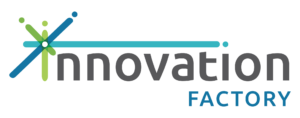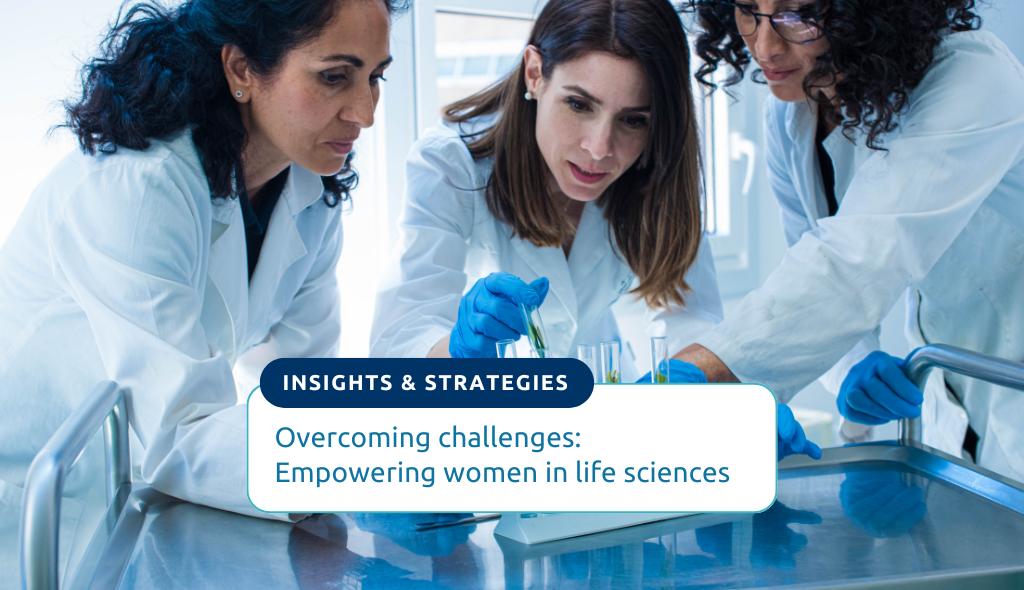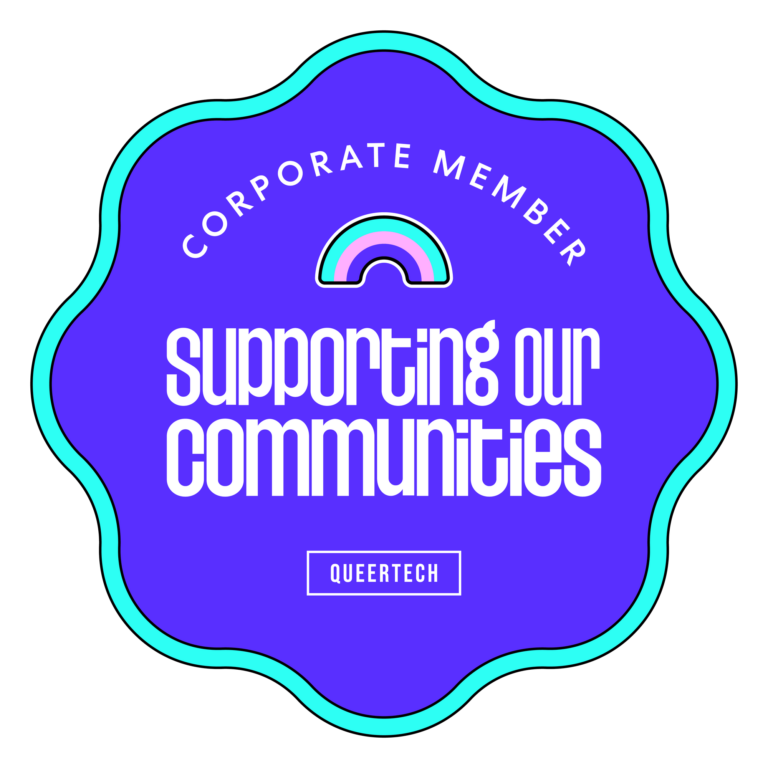In the rapidly evolving life science sector, women-identifying entrepreneurs are carving out spaces for innovation and leadership albeit facing unique challenges and seizing distinct opportunities.
As part of Innovation Factory’s Inclusivity Business Resource series, Rachel Bartholomew, CEO of Hyivy Health ↗ and Founder of Femtech Canada ↗, facilitated a panel discussion of industry leaders delving into the multifaceted challenges and emerging opportunities for women in life sciences. This session not only highlighted barriers but also offered strategic insights to support women to reach the forefront of this sector.
Persistent Challenges for Women in Life Sciences
A critical barrier for women in this field is the significant gender bias in funding. The life sciences sector, like many tech fields, predominantly features male entrepreneurs, significantly impacting women’s confidence and public perception. This disparity extends to venture capital, where women’s businesses are often scrutinized more harshly and evaluated on their track record while their male counterparts are typically evaluated on their potential.
Subsequently, women entrepreneurs often struggle to access early-stage capital, which is crucial for scaling their businesses and securing executive positions. The absence of representation at these levels perpetuates the cycle of inadequate support and mentorship, making it even more challenging to navigate the path to leadership.
The challenge is compounded when pitching a women’s health or femtech innovation to predominantly male investors who may not have a fundamental understanding of women’s health issues, the biological nuances, or the substantial market potential these solutions hold. This gap in understanding can lead to significant communication barriers, where women must educate investors about the basics of women’s health needs in addition to delivering a compelling business pitch.
The lack of immediate comprehension and empathy from male investors often results in underestimated market potential and, consequently, hesitant or inadequate funding. This systemic issue not only stifles innovation in women’s health but also impedes the progress and launch of potentially groundbreaking solutions designed by and for women, perpetuating a cycle of underrepresentation and underfunding in life sciences.
Barriers to Growth: Why Diversity Matters in Life Sciences
“Imposter Syndrome” is prevalent among women in life sciences, where individuals doubt their accomplishments and fear being exposed as a “fraud.” This lack of confidence is a significant barrier, exacerbated by societal norms that undervalue women’s contributions compared to men’s.
From a young age, girls perform better in standardized testing but are less likely than boys to assert their understanding and competence. This disparity suggests that early educational and developmental experiences contribute to long-term confidence issues, which can impact professional endeavors, including entrepreneurship.
Creating robust support networks and mentorship opportunities is crucial for women entrepreneurs. Peer-to-peer support and strategic mentorship can significantly build confidence and resilience, helping women navigate the challenges of the life sciences sector.
Investing in Women in Life Sciences
Women founders bring unique perspectives to the table, particularly concerning women-specific health issues that are often underrepresented in research and development. Recognizing and investing in these perspectives offer opportunities for innovation in healthcare that can benefit a broader demographic.
In addition, a lack of equitable and diverse perspectives in research and policymaking can lead to outcomes that do not fully address or understand women’s health issues. This oversight emphasizes the need for more inclusive practices and policies that consider the diverse needs of the population.
Despite the clear benefits, institutional funds have historically favored sectors like cleantech over women’s healthcare, forcing women-led companies to rely on grassroots fundraising efforts. This imbalance highlights the critical need for more women investors and advocates to support and invest in women-led ventures actively.
Taking action and driving change
The discussion concluded with several actionable tips for women in the field:
- Build your network: Regular engagement with peers, mentors, and industry leaders is essential for growth and success.
- Educate yourself and others: Understanding the complex jargon and financial landscapes of the life sciences sector can demystify processes and open up new opportunities.
- Be bold and self-reliant: Women should take charge of their contributions and decisions, asserting their roles and expertise confidently.
- Utilize available resources: Programs like the WEOC’s National Loan Program and PROSPER BIZCamp ↗ provide financial and educational support that can be crucial for early-stage life science entrepreneurs.
Reshaping the life sciences sector
Change doesn’t happen overnight. However, the collective insights from this panel provides a roadmap for nurturing and empowering women-identifying entrepreneurs in life sciences. By collaborating with stakeholders and integrating gender and diversity lenses, the sector can not only achieve inclusivity but also drive innovative and equitable development.
As we continue to break down these barriers, the life sciences industry will become more diverse, innovative, and successful, reflecting the true potential of its entrepreneurs.
Backgrounder
Panel Discussion on Challenges and Resources Available to Women-identifying Entrepreneurs in Life Science Meeting Minutes
Date: Thursday, April 11th, from 12:00 – 1:30 pm EST.
Panelists:
- Alyssa Lauren Rowe, Business Advisor & Program Manager at Innovation Cluster
- Céline Chabée Partner, Pender & Howe Executive Search and member of the Women in Bio (WIB) Montreal Executive Steering Committee
- Garima Ghale, Senior Program Manager at Ontario Bioscience Innovation Organization (OBIO)
- Heather Sadowy, Loan Manager at Women’s Enterprise Organizations of Canada (WEOC)
- Parneet Dehl, VP Life Sciences, Banking at RBCx
- Renée Gendron, Lead Regional Coordinator at PARO Centre for Women’s Enterprise
- Sigrun Watson, Chief Strategy Officer and founding member ThinkrBelle
- Wendy Cukier, Academic Director, Diversity Institute; Women Entrepreneurship Knowledge Hub
Moderator: Rachel Bartholomew – Lead Advisor at Femtech Canada, CEO and Founder of Hyivy Health
1. What are some challenges you see faced by Women-identifying entrepreneurs in the life science space?
- Accessing appropriate talent and funding
- Lack of industry knowledge and expertise
- Angel Investment and Government banking supports women in life science, VCs seems to be lacking
- Early access to capital in the seed and pre-seed stage
- Time constraints (community and family)
- Path to scaling isn’t always as clear
- The visuals we see representing entrepreneurs in life science are majority male, and research shows that has a profound impact on how women are treated in that space
- VCs make decisions investing in women based on their track record and men on their potential – Great article: Male and Female Entrepreneurs Get Asked Different Questions by VCs — and It Affects How Much Funding They Get
- Finding partners and customers
- Every single piece of the ecosystem needs to change; the way women are treated in Incubators and Accelerators are different than men
- More challenges at the boardroom/executive level because of a lack of a mentorship which is due to a lack of representation
2. What are some future trends you see for Women-identifying entrepreneurs in the life science space?
- Health-tech investors are showcasing more discipline, preferring B2B models, also demanding a closer look at the tech and the talent pool (company needs to demonstrate efficient talent process)
- Women often experiencing “Imposter Syndrome”
- Research shows women won’t take the leap until they feel they are ready, vs men are more likely to jump in without the experience/expertise
- Double bias for older-women, even though research shows older women have a better understanding of their own markets and own strengths and weaknesses that a strength for these entrepreneurs
- Women are 1.7 times more likely to experience anxiety in the professional setting
- Women usually start businesses based on their experience with the problem they are solving
- Imposter syndrome: let’s flip the characterization from weakness to women are cautious and careful on how they proceed, taking items in smaller steps.
- Women often lack the same amount of confidence that men have. In standardized testing, little girls perform better than boys, yet when they are asked if they understand the activity, the boys are more likely to say yes than the girls.
- How women present themselves and how they treat each other is often an issue
- Women’s perspectives identify great opportunities to invest in. For example, research is happening around things like menopause and investors are now taking notice of the spaces
- And it is indeed a problem worth solving: 1 in 10 women leave the workforce because of untreated symptoms of menopause
- Lets not forget how COVID affected women specifically, having that time help plant a seed of business ideas that started to grow, exposing them to ideas that they didn’t have before
3. What have you learned working with Women-identifying entrepreneurs in the life science space? Examples include challenges, key success factors, misconceptions, etc.
- With the WEOC National Loan Program running for the last year and a half, we haven’t seen many life science companies apply, which is a shame because the program can be great for even early stage projects
- Women are always willing to ask for help with what they don’t know
- It’s helpful to have these types of conversations to allow folks to grow that confidence to find that support they are looking for
- Programs for entrepreneurs and peer-to-peer support has a great impact on women-identifying entrepreneurs
- Women when in leadership in life science, always showcase resilience, drive and purpose
4. What is the benefit of investing in and/or hiring Women-identifying entrepreneurs in the life science space? What are areas for improvement in the investment space for these groups?
- We see that cleantech and climate change gets a larger section of the institutional funds than supporting women, you see more women-lead companies doing grassroots fundraising
- Women ask different questions and women then perceive the world differently
- It would be great to see more education for the business advisors working with the entrepreneur. As some entrepreneurs aren’t aware of what types of funding is available and when, what types of things can be financed, when to focus on VCs vs grants, etc.
- I would like to see better transparency to improve best practices of financial institutions and VCs. These groups get protected by regulations that we don’t have visibility on. There’s no requirement for the business development corporation of Canada to give us information on who they are lending money to, what the terms are, etc.
- Investing in Women Code IIWC
- We have found that small business loan interest rates for men are lower than women and BIPOC folks.
- We know a lot of financial institutions they were lending to women on high interest offerings and calling it “supporting women”
- Continue to reframe the gaps. Financial literacy for women, gender literacy among the gatekeepers is important.
- The OBIO Women in Health Initiative (WiHi) ↗ program has a Seed Program for up to $20,000 CAD in grant funding for early-stage women-led health science companies as well as training programs focusing on senior management and leading companies.
- Regulations and standards are a key part of the industry, and if you don’t have a gender and diversity lens, you have systems that kill women at a much higher rate. For example in pharma, Black and Indigenous Women weren’t included in the research for genetic testing for breast cancer. Ultimately, the whole research of genetic testing was skewed because the testing missed a large part of the population.
5. What do stakeholders need to do to better support Women-identifying entrepreneurs in the life science space?
- Building the network! Introductions and support can really foster innovation and growth
- Entrepreneurs, we can coach our stakeholders. We need to ask for what we want, including male allyship
- Demystify and avoid using complex venture jargon to make it more accessible and clear to help navigate the early-stage entrepreneurs
- Take women-owned companies seriously! Women own, innovate, export, hold patents, etc
- Collaboration between partners
- Women should be celebrating their success more, and we should encourage everyone’s successes!
- Trusting in ourselves more needs to happen – an event like today will hit home for a lot of us, we all have something important to say and have that confidence in us to share
- Diversify mentorship
- The Excellence in Canadian Board Governance (ECBG) Program just launched to connect folks in the ecosystem
6. Tips and resources:
- Don’t rely on the men on your team to answer questions you can answer yourself
- If they can do it, how hard can it be?
- Distinguish between what you need to know, what your strengths are, and what you need to buy or pull in as partners. Often women don’t ask and think they need to know it all
- Women are more likely to offer help than ask for help
- Be out there as much as you can, you never know who you’re going to meet
- Speak about what you’re working on every chance you get
- Building your network is your strongest resource!
- Lean on the women and be bold with the men
- Know your superpower: what gives you passion, what gives you joy, what you’re good at, being intentional with your time and say no when you want to say no:
- Find your supergroup; your mantle, your peer to peer, coaching group
- Involving fractional management can add a lot of value, surround yourself with the missing talent. Check out Pender & Howe’s new platform Flex Exec, a digital marketplace, where you can quickly access fractional or interim leadership talent, on-demand.
- Push for diversity!
7. Additional Resources:
- Women and the Venture Capital Industry in Canada and the United States – Diversity Institute – Toronto Metropolitan University ↗
- Future Skills Centre ↗ – focuses on strengthening Canada’s skills development ecosystem so that Canadians can look to a future of meaningful and relevant lifelong learning opportunities.
- Male and Female Entrepreneurs Get Asked Different Questions by VCs — and It Affects How Much Funding They Get ↗
- Women’s Enterprise Organizations of Canada (WEOC)’s National Loan Program ↗ – which supports women entrepreneurs as they start, scale, grow and maintain their businesses. The program offers an inclusive approach to lending, providing robust wrap-around services that set women entrepreneurs up for continued growth and success.
- Investing in Women Code IIWC – British Business Bank ↗
- Invisible Women: Data Bias in a World Designed for Men by Caroline Criado Pérez ↗
- Beyond Boundaries – 9-week training program that supports women entrepreneurs to grow and scale their businesses and reach global markets.
- Launch of LevelUP Startup Accelerator ↗
- ECBG Greater Montreal | Groups | Women In Bio ↗
- Femtech Roundtable – Femtech Canada
- The State of Women’s Entrepreneurship in Canada [PDF] ↗
- PAROProsper pre-eligibility – BIZCamp Program ↗
- OBIO® WiHI Breakfast Series: TELUS Pollinator Fund — OBIO – Ontario Bioscience Innovation Organization ↗
- Flex Exec ↗ is a digital marketplace, where you can quickly access fractional or interim leadership talent, on-demand.







